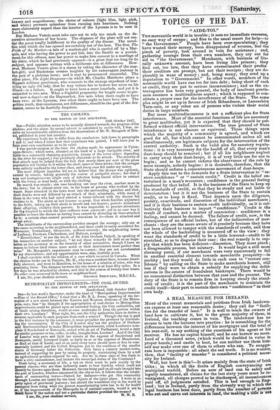THE CHOLERA.
TO THE EDITOR OF THE SPECTATOR.
19th October 1847. 19th October 1847.
Sin—Public attention seems to be uneasily directed towards the progress of the cholera; and the alarm its second advent is calculated to excite will, I fear, re- ceive no inconsiderable addition from the observations of Mr. W. Ilerapath of Bris- tol, published in your last number. My experience leads me to differ from the conclusions laid down in paragraphs 1 and 4; and when I relate how that experience was gained, I will leave you to form your own conclusions as to its value. I was parish-surgeon at the time the cholera made its appearance in Upton- upon-Severn; which town, situated on the bank of a large navigable river, and liable to a constantly changing population, (many of the lower orders depending on the river for support,) was peculiarly obnoxious to its attack. The severity oT that attack may be judged from the fact that nearly three per cent of the gross population fell victims to it within the short space of three weeks; but the ravages
w e entirely confined to the lower class, and every case fell under my notice. The most diligent inquiries led me to believe that the disease was epidemic, cattsed by miasm, taking generally the course of navigable rivers; but that it was not contagious—no single case of infection being traced either to contact with the living or dead body, or with the clothing. Its march was erratic: one case breaking out near the river, another more in the town; but in almost every one, in the house of persons who worked by the water. Some attacked in the town went into the surrounding parishes and died; their deaths were not followed by an attack of their attendants, while many of those in the town who had never entered a house infected with the disease fell victims to it. The alarm at last became so great, that whole families adjourned to the fields, taking up their abode in hovels and out-houses; parents abandoned their offspring, children their parents. It was impossible to procure attendants for the hospital to which the later sufferers were conveyed: yet in no case was it possible to trace the disease as having been caused by attending on those attacked by it; a certain class seemed peculiarly obnoxious to it—those it attacked and swept away.
The inhabitants of the surrounding parishes escaped the scourge; only one or two cases occurring in the neighbourhood, and those could be easily accounted for. Worcester, Tewkesbury, Gloucester, suffered severely; the neighbouring towns of Ledbury, Pershore, Cheltenham, and Malvern, escaped. " Nevertheless," to use the words of Sir John Graham Dalyell, in speaking of his researches on another subject, "let not these remarks be held as an impu- tation on the accuracy or on the veracity of other naturalists, though I have no reason to believe their vision more acute or their instruments more perfect than mine." Mr. Herapath's experiments may be correct: they are not corroborated by my observations; and my opportunities were, alas, fearfully great.
I shall conclude with the relation of a case which occurred in Canada. When the cholera broke out in Toronto, Mr. H., who was a resident there, became dread- fully alarmed, and went to Hamilton, to the house of a relation of mine, who was practising there. The distance between the two towns is at least fifty miles. In a few days he was attacked by cholera, and died in the course of twenty-four hours. No other case occurred in the town or neighbourhood. I am, Sir, your obedient servant, GEORGE SHEWARD, M.R.C.S.L.
























 Previous page
Previous page